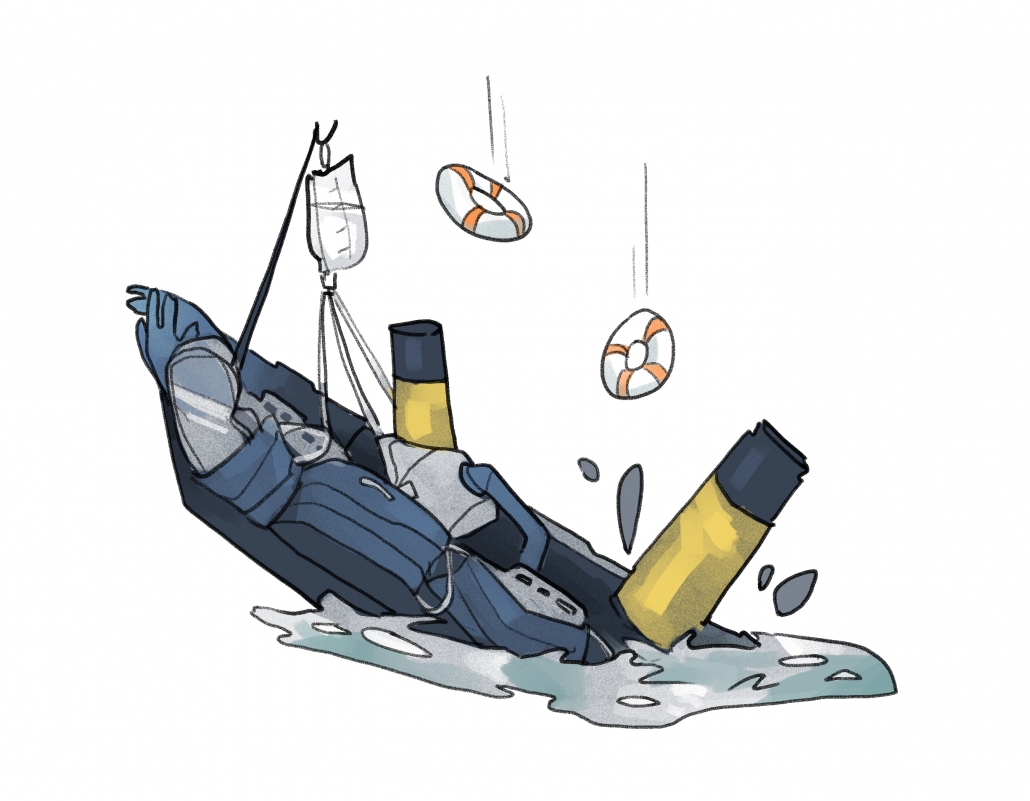The coronavirus highlights faults in the American health care system

As another uncomfortable week of quarantine slithers past, millions of Americans remain anxious about the toll that the coronavirus pandemic will take on the country. Before long, many will be diagnosed with the virus and be forced to seek treatment from health care facilities that are already beginning to collapse under such unimaginable burdens. As pulmonary and critical-care physician Dr. Daniela Lamas grimly noted in The New York Times, many will draw their last, labored breaths in relative obscurity, denied the chance to say their final goodbyes to loved ones.
It does not have to be this way.
While the arrival and subsequent spread of the coronavirus were all but inevitable, the country’s systemic refusal to prepare for this crisis has profoundly exacerbated the damage it caused. Inadequate funding for health care infrastructure, disincentives for medical training and scattershot means of providing coverage have rendered the United States exceptionally vulnerable to this pandemic.
The devastating ineptitude of the U.S. health care system was a widely covered topic well before the coronavirus arrived. In tragic irony, the waning months of the 2010s were especially dominated by grandiose promises to finally fix the system. The rhetoric of optimizing treatment and guaranteeing coverage was an inescapable motif throughout the duration of the recent Democratic primaries — just as it has been in nearly every single election cycle since the start of the century.
And yet, in spite of such overwhelming discourse, the federal government has invariably failed to make any tangible progress in this regard. Rather, tedious debates, partisan gridlock and empty policies delay pressure for critical reform and therefore maintain complicity. Now, the consequences wrought by decades of Congress’ unwillingness to take necessary action are erupting in an unprecedented catastrophe.
In marked contrast to most of the modern world, the United States has been historically reluctant to allocate federal funding for health care. Instead, the country has opted for a system primarily funded through private insurance, wherein steady employment is often a prerequisite to treatment, according to data gathered by the U.S. Census Bureau. In doing this, the United States has established a system that forces providers to consider treatment within the contexts of the bottom line, rather than prioritizing an assurance of quality care for all.
Therefore, most health care facilities are operating under extremely narrow margins and are seeking to do as much as they can with as little as possible, inherently constraining the resources made available to each individual patient. Necessities such as masks, ventilators and beds are allocated with intense frugality, just barely stocking as much as needed under typical circumstances, according to data collected by the Health Policy Center at the D.C.-based Urban Institute.
Except these times are anything but typical. Government officials throughout the country spent months refusing to spend public money in preparation for the impending crisis. In keeping with its own status quo, the government absolved itself of responsibility for the nation’s health care system, deferring that duty to the underfunded disarray of the country’s private sector.
As cases of the coronavirus began to trickle out of China, Italy and other high-risk countries, the American health care apparatus was little more than a ship on a fixed course toward an iceberg. Without pre-existing, sufficient access to public funding, the proverbial ship was equipped with nothing other than a faint hope that the government would distribute life preservers only after the sinking had already begun.
As the pandemic disrupts all aspects of society, a health care system that is largely contingent on the prosperity of the private marketplace is nothing short of doomed without government intervention. The inevitable surge in unemployment will inherently yield an abundance of uninsured patients who will face dizzying out-of-pocket expenses for treatment. For many Americans, the total cost of recovering from the coronavirus will surpass their annual income.
In principle, the virus has not introduced these issues to American society. Rather, the disease has exploited the countless systemic inadequacies that have long defined the existing state of our health care. According to experts, including Dr. Anthony Fauci, the director of the National Institute of Allergy and Infectious Diseases, thousands — if not millions — of people will die directly as a result of this disease. Moreover, a recent edition of the New England Journal of Medicine asserts that many others will be auxiliary casualties of the pandemic, succumbing to ailments that are entirely unrelated to the coronavirus simply because the existing apparatus is unable to treat them.
As a result of these desperate circumstances, the country has resorted to draconian measures hitherto unthinkable in modern life. In a rather futile attempt to stymy the spread of the disease, the government has hastily sought to perform its duties retroactively. After years of denial, the threat of millions of casualties has compelled our leaders to treat health care as a universal, public right.
While these efforts may ultimately prove to be too little, too late, they may prove to be a silver lining as this crisis continues to cast its ominous shadow on the country. The coronavirus may soon serve as a catalyst for enlightenment, engendering a new era in which the United States finally recognizes its standing obligation to ensure adequate health care of its people. Although this does not atone for its past failings, it is a hope that must be maintained during these trying times.

